*** “With miles to go before he sleeps” was the subhead in this story/interview published in the Philippines Graphic in 2004.)
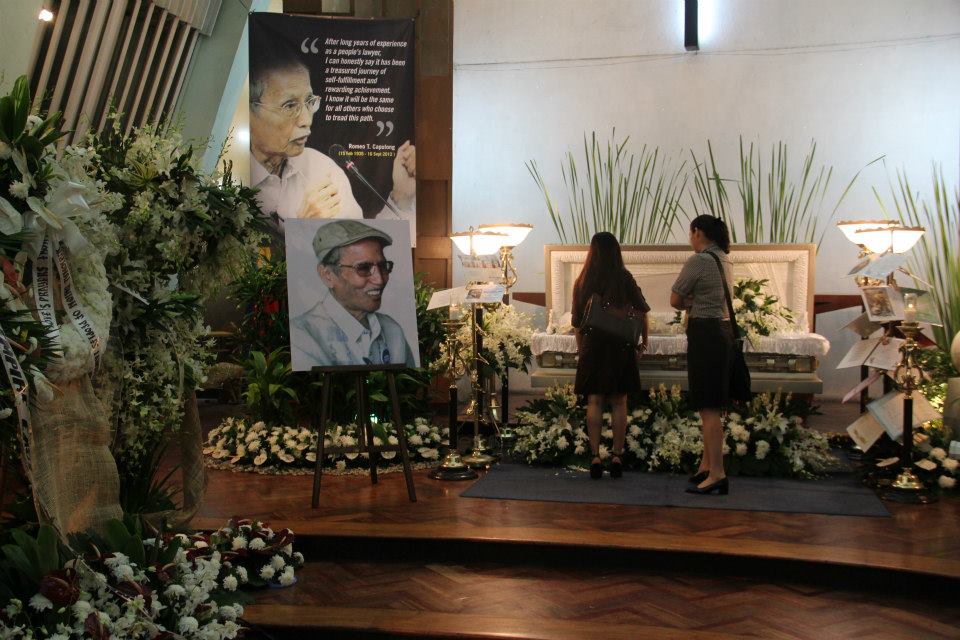
It is a young man’s voice, pitched low but musical. It is a donnish mien. Lawyer Romeo Capulong reclines on a lounge chair, legs crossed, one gently swinging. His is an old world charm; strangers could be forgiven for mistaking him as the owner of the old-wood furniture gallery cum café.
Yet for the last two decades, Capulong, who turned 70 on February 15, has borne the tag, “The Communist Lawyer.”
It is a title at once prestigious and dangerous, depending on your place in the political spectrum.
Capulong has straddled all sides. This farmer’s son from Nueva Ecija has gone through traditional law practice, a constitutional convention, electoral politics, and high-powered bourgeois fraternities and organizations.
He is more better known, however, as legal counsel to the National Democratic Front negotiating panel. That makes him a key actor in a peace process that takes flight or stumbles according to the political fancies of rulers and rebels.
In 1999, as a member of the Integrated Bar of the Philippines national directorate, Capulong joked about his Red credentials, playing coy and sardonically aping the US government’s “neither confirm nor deny” pronouncements.
Now, in the autumn of his life, the man who at 65 awed then Senator Loren Legarda with his swift ascent of rugged mountains – in the cause of freeing prisoners of war – repeatedly invokes his independence from his famous client.
Ringside seats
As he deals with the latest round of movement in the Public Interest Law Center, Capulong muses about the changing norms of commitments and struggles. His eloquence hints at long hours of thought. Showing full grasp of the changing times, he discusses what the Left (legal or underground) needs as it struggles with increasingly alienated middle forces. He rubs his palms and jiggles a leg. The subject matter is familiar. It is a major theme of the present imperfect.
Capulong is arguably the Left’s most famous outsider, though military sleuths claim otherwise, noting his services to fringe sympathizers (the late Ninoy Aquino, for one) and underground stars who have since become each other’s deadly foes.
One might fault Capulong’s politics but even critics shake their heads at his staying power. He has mentored many lawyers: Alex Padilla has assumed high government posts; Jong Olalia, son the slain leader Rolando, is now labor attaché to Canada. (*Jong has since returned to practice law in the country.)
The young ones come and go, according to life priorities and shifting ideological views. Capulong remains the grand old man of people’s lawyers. It is a lonely position. His sad eyes belie statements of optimism. But Capulong is no stranger to the ups and downs of struggle. He knows there is a time for everything, including moving on.
Lost friends
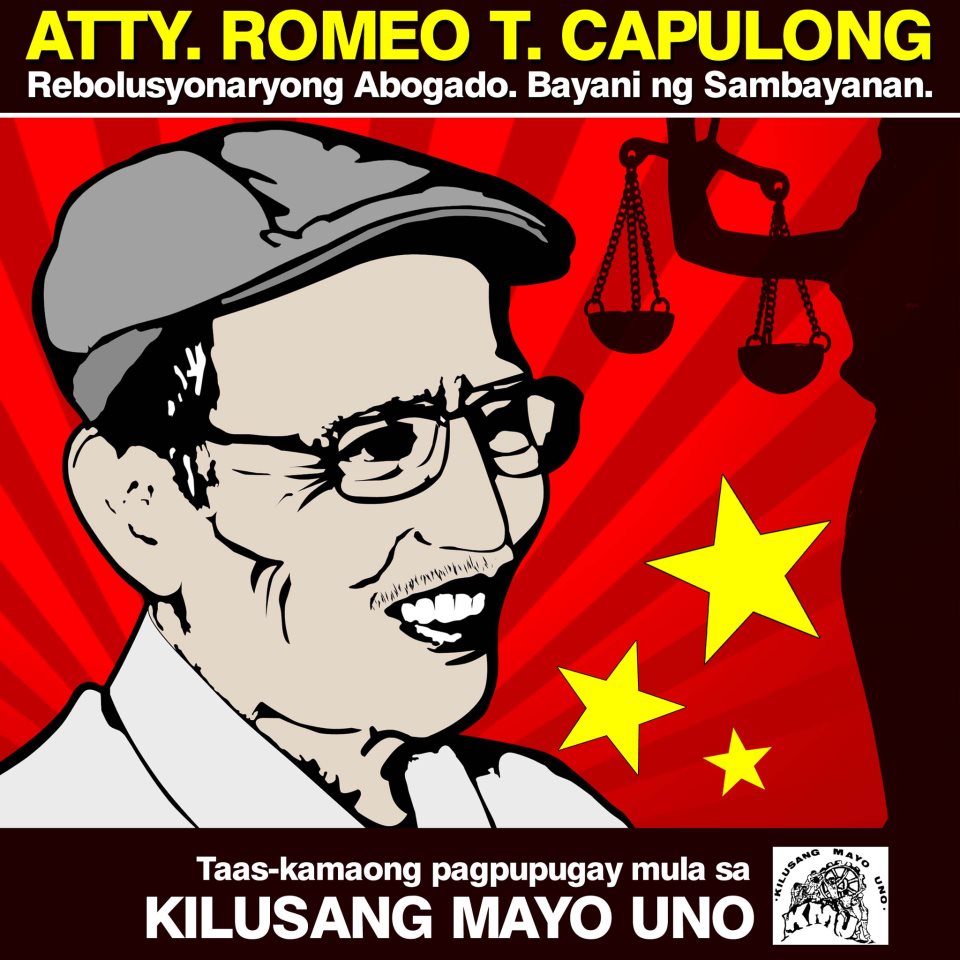 Despite his gentle voice, he displays a relentless will that screams, “Alpha Male”. He openly and unrepentantly admits to “authoritarian” tendencies. Like any patriarch, he has loss as constant companion.
Despite his gentle voice, he displays a relentless will that screams, “Alpha Male”. He openly and unrepentantly admits to “authoritarian” tendencies. Like any patriarch, he has loss as constant companion.
Capulong has occupied prime ringside seats into the Left’s turbulent history.
In the years just before martial law, he remained friendly with old communist party cadres even while attending the discussion groups of the young turks who went on to preside over Asia’s longest home-grown leftist insurgency.
He and other traditional lawyers braved martial law captors to forge links with the revolutionary underground. His passions blazed and waned, until a second brush with dictatorship set him full course on alternative law.
The lawyer saw the Left grow from a gaggle of academics stumbling across limestone cliffs, to become a national movement of activists and cadres that chipped away at a dictator’s power base.
The leftist underground expanded in the turbulent post-EDSA I years that saw pitched battles with the Right.
Success brought its dark side. Capulong and other human rights workers scrambled to clean up the mess as adventurism and over-expansion opened the Left to backlash. He would later stand helpless as a new split convulsed the new Communist Party of the Philippines split. He was one of many believers and sympathizers who remonstrated – often futilely — with both sides. He still grieves over the murders of former clients.
Contradictions
Capulong does not hide his admiration for fellow Alpha male Jose Ma. Sison, top honcho of the communist movement. Yet neither does he hide his dismay at how the Left has devoured its own children — not just the top guns of the rejectionist factions, but also the thousands of innocent victims of its purges during the 1980s.
He is amazed by how cadres uncritically spouted party lines to justify the purges. Among the excuses peddled then was a clearly fantastic tale of the US American Central Intelligence Agency recruiting 400 deep penetration agents before the proclamation of martial law, agents who had ostensibly climbed through the ranks of the various leftist underground departments and who, one cadre told Capulong with a straight face, had confessed to being US spies.
Hardly surprising. Survivors of the purges tell of torture that could make you fess up to the murder of Andres Bonifacio.
And yet Capulong remains a believer in the national democratic cause. He sees it as a bulwark against efforts to wrest back the democratic gains achieved since the first People Power.
The Philippines Graphic talked with Capulong about life on the fast lane, life on the run, staying afloat amid shifting ideological currents, walking a thin line between legal and illegal, the difficult choices that face an activist, and things that remain the same. Is his a well-deserved optimism, or the just an aging lion’s stubborn effort to retain control of a life fast passing by?
The following are excerpts from the interview:
Graphic: At 70, you’re still the lawyer of the National Democratic Front
Capulong: I prefer to be called a people’s lawyer. Of course, the more popular term is human rights lawyer, popular during the time of (the late President Ferdinand) Marcos. It is also called public interest lawyer or one who practises alternative law.
The more accurate term is people’s lawyering, or lawyerring for the poor and the oppressed and the exploited sectors of society.
Graphic: Do terms really matter?
Capulong: Yes, it is important. With “people’s lawyer,” right away you send a message.
We often equate lawyering for the poor with welfare-ism. That is not the type of lawyering we want in the Public Interest Law Center. There are enough legal aid programs. We all know the Public Attorney’s Office. It has about 1,000 lawyers nationwide; the IBP has its legal aid program. These are all traditional modes of free legal assistance for litigants, programs responding to a big need.
But progressive lawyers should transcend that, put in some developmental content, then use issues to raise consciousness or social awareness, and help in organizing for a just society, and even in the development of unity in militance among your clients
Graphic: So just what are you to the NDF?
Capulong: To be accurate, my undertaking has been as lawyer for the NDF’s negotiating panel in peace talks with the government
Graphic: You’re not general counsel of the NDF?
Capulong: I am clarifying this. The NDF does not need a counsel because it operates outside the legal judicial system. They become subject to our legal and judicial system only when some of their forces are arrested and may have to temporarily enter the legal system. Then we take on individual clients to protect their legal rights.
But the NDF itself operates independently. Sa peace process, recognized sila as a separate political entity or authority.
Graphic: An image problem then?
Capulong: Yes, we have real image and security problems. That is why we at PILC assert our status and the legitimacy of our profession.
I was once a member of IBP board of governors. We made a survey of lawyers’ knowledge of our task. Most of our own colleagues called us queer, sometimes radicals, subversives, communists. Not surprising because of structural realities.
Most professionals are urban based, corporate oriented, profit driven. How many would go into lawyering for the poor or the indigents? Napakaliit na bahagi. (A very small percentage) But it should be recognized as a legitimate field of law practice and it is recognized all over the world.
Third World countries like the Philippines should recognize this specialty. Yet there is a conscious effort by the state and military to frame us, to trap us in that very narrow framework.
Graphic: If your clients and market are so poor, how do your sustain your operations? And is it possible to be lawyers for the NDF in the peace talks and not actually believe in the things they espouse?
Capulong: No, no. It is not possible. To be an effective lawyer for your client, you must be committed and dedicated.
First of all, you have to believe that we should be engaged in a continuing struggle for a better society. Just call it a just and humane society. As a lawyer, you should be able to look at your profession as part of that struggle.
You know at one time I was chair of one human rights group; umalis na ako dahil wala nang time. But when I was chair, I was deeply involved; I wasn’t just an honorary chair. The practice is, you’re usually there as decoration.
Graphic: But can’t a lawyer safeguard a client’s rights but still remain neutral?
Capulong: That’s the traditional concept. And that’s why PILC doesn’t accept funding despite financial constraints. In the struggle, in this kind of society, neutrality is hard. A funder could insist on the universality of the so-called human right concept, that work in this area should be non-political.
One funder of a human rights group said they would only release money with proof that we were politically neutral. I argued against that. In RP, how can you be a committed HR worker at P3,000 a month, expose yourself to great risks, and not be committed? You have eyes, ears, a brain, and you go to the countrysides. It would be impossible to remain neutral.
Graphic: How committed is committed? And to what?
Capulong: I have tried to impart to my colleagues, the younger lawyers, that you must be committed, you must be dedicated. And you should believe in what you’re fighting for, and generally the cause of your clients, their struggle.
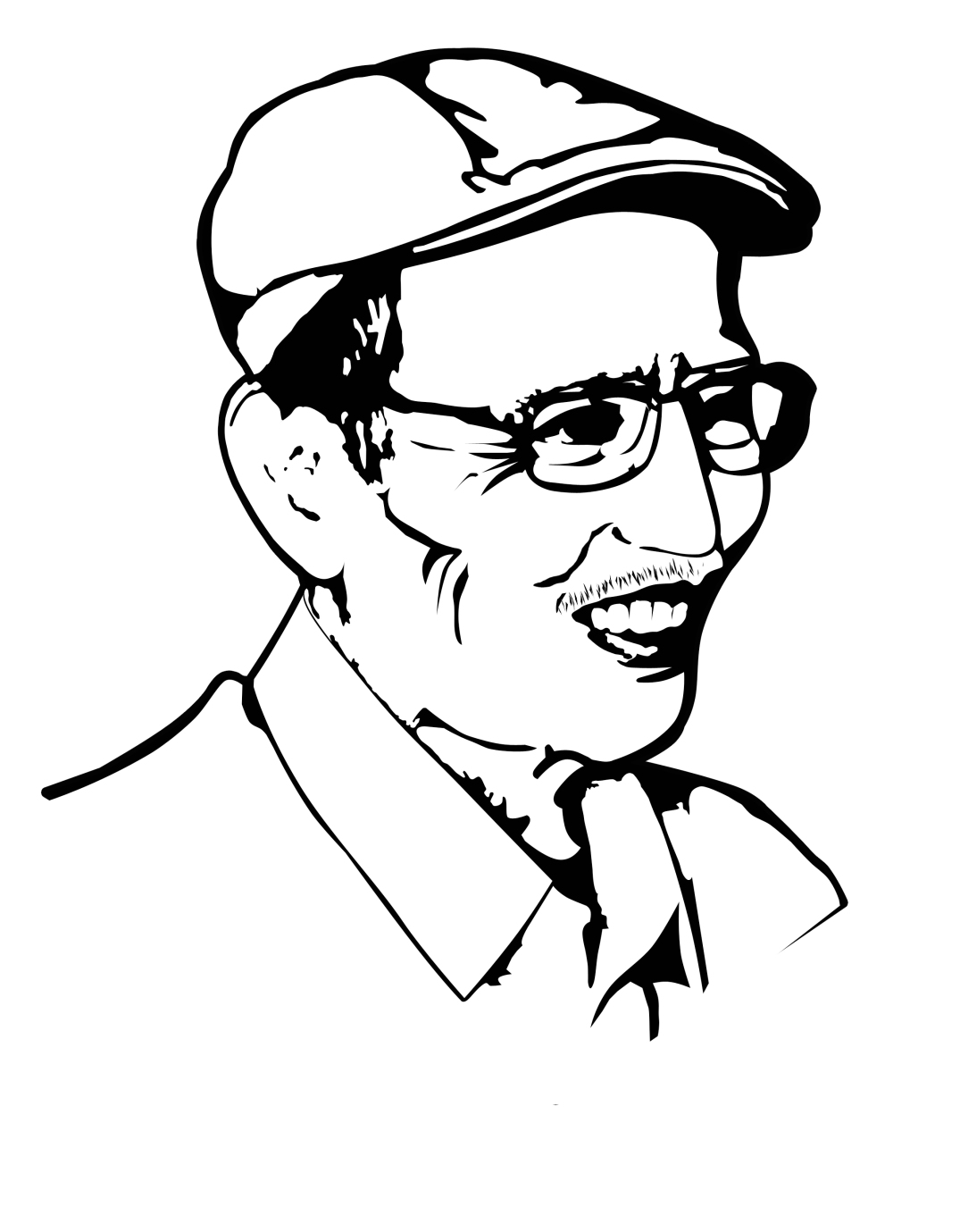
Graphic: Are we talking armed struggle?
Capulong: The struggle doesn’t have to be ideological. It can be issue based. The struggle of peasants, how many issues are involved there? The struggle of the workers… urban poor, women, youth, students…You have to believe in their struggle. That doesn’t mean you are a kasama, or a cadre.
Graphic: Straight out. People are dying to know… cadre ka ba?
Capulong: No. (He breaks into laughter.) I am not a cadre.
Graphic: Just a believer?
Capulong: Let me go on. When you say you believe in the revolutionary movement, you have to take its program to heart. Yes, I studied the program of the NDF right from the start, the 12-point program.
Graphic: And you believe in the NDF program?
I believe there is room for debate on the means, but I cannot argue with the program. Who can argue against a genuine agrarian reform? Or nationalist industrialization? [Editor’s note: A lot of economists say it’s a concept past its time] Or the kind of culture we must espouse? Cultural revolution and so on. Generally, who can argue against the nationalist democratic struggle?
Graphic: Lots of folk, actually. Many see the Left as a dinosaur that causes more harm than good.
Capulong: Yes, you may not agree with the means. As far as I am concerned, I am a lawyer. I’m even a judge of an international court now. So I work within the system. But as I told the IBP during one national assembly, the law is merely the expression of the dominant interest in society and I am willing to argue with anybody on that.
Graphic: Is this a case of flexible legal standards? Is that a justification of armed struggle?
Capulong: The law as we know it, is a means to perpetuate an unjust system. There are a few progressive laws that pass a conservative, reactionary legislature but these will have safety valves and loopholes for ruling interests.
Having said that, I believe we people’s lawyers should be able to creatively use the law and the legal system to advance the interests of our clients.
Graphic: That’s a dream, a long-term goal. What do you do in the here and now?
First of all, to protect our clients from unjust laws and abuses. That’s primary. So sa people’s lawyers, you can’t waver – and this is what other lawyers should emulate – always primordial are the interests of your clients whether individual or collective. While you may have a cause, always put the individual and his rights first. All other issues are secondary.
Graphic: Don’t lawyers take losing propositions just to highlight a cause
Capulong: No, that is a betrayal of trust. You must fight it out. For example, the Flor Contemplacion case. When I was fighting for her life in Singapore, my entire focus was to save her life. It was secondary that I shake up the government and other institutions to recognize the plight of domestic workers all over the world. That is the task of other groups, not the lawyer. The principal is to save a life, even just one life. [Editors’ note: Singapore executed Contemplacion for murder.] That’s a given and that should govern the guidelines. Secondary ang buhay? Secondary sa struggle? Di pwede yun. (That’s unacceptable.)
You cannot turn a client into a prop. I will not allow that. I will never allow that. I always tell my lawyers. Principal yan. Kahit ano pang impluwensya pumasok dyan, (no matter your influences) follow that guideline.
Graphic: How does PILC survive without funders?
Capulong: When I came home (from the United States) in 1986, I made a study of this type of lawyering. I studied the US and Japan. And I saw one common error. They had no self-reliance program. So they get dissolved. Even FLAG (Free Legal Assistance Group, at one time the biggest human rights lawyers’ organization), at one time folded up. Mabini folded up, as did the Protestant Lawyers’ League, Alter Law, Makatao in central Luzon, Bicolandia. None survived because they all lacked a self-reliance program.
Graphic: How does that work?
Capulong: The only way we can do it… if you have 2,000 clients (families) if you inculcate the importance of legal services and make them realize why this type of lawyering needs to survive. Just a peso or two pesos or P10 per family a month and that can sustain a lawyer.
The problem here is welfarism. People believe human rights lawyers should be martyrs. People think all human rights services should be free. That’s wrong. Institutions need to survive and their staff, too, as middle class and concerned Filipinos.
Graphic: So your Hacienda Looc clients pay?
Capulon: No, not yet. That’s what I meant, the mindset that services should be free. We have three kinds of clients. They belong to category of those who cannot afford to pay or who have not yet absorbed the mindset I want. But we should develop that base as main resource center, though we still struggle against the welfare mentality.
So because we don’t have that economic base, we accept revenue generating cases that do not conflict with our mandate.
Graphic: Like? Please give an example.
Capulong: Like breach of contract cases, or even big firms as long as their cases do not go against our struggle.
Graphic: A particular case may have no bearing on the struggle, but what if the prospective client is involved in other controversies that could indirectly affect your principal clients?
Capulong: We stay away from multinationals, or companies with bad labor policies, or notorious land grabbers. We need to trust out client.
Graphic: How big is the percentage of revenue generating cases?
Capulong: Before, it was only 30% revenue generating as we were busy with other cases, now 40 to 50%.
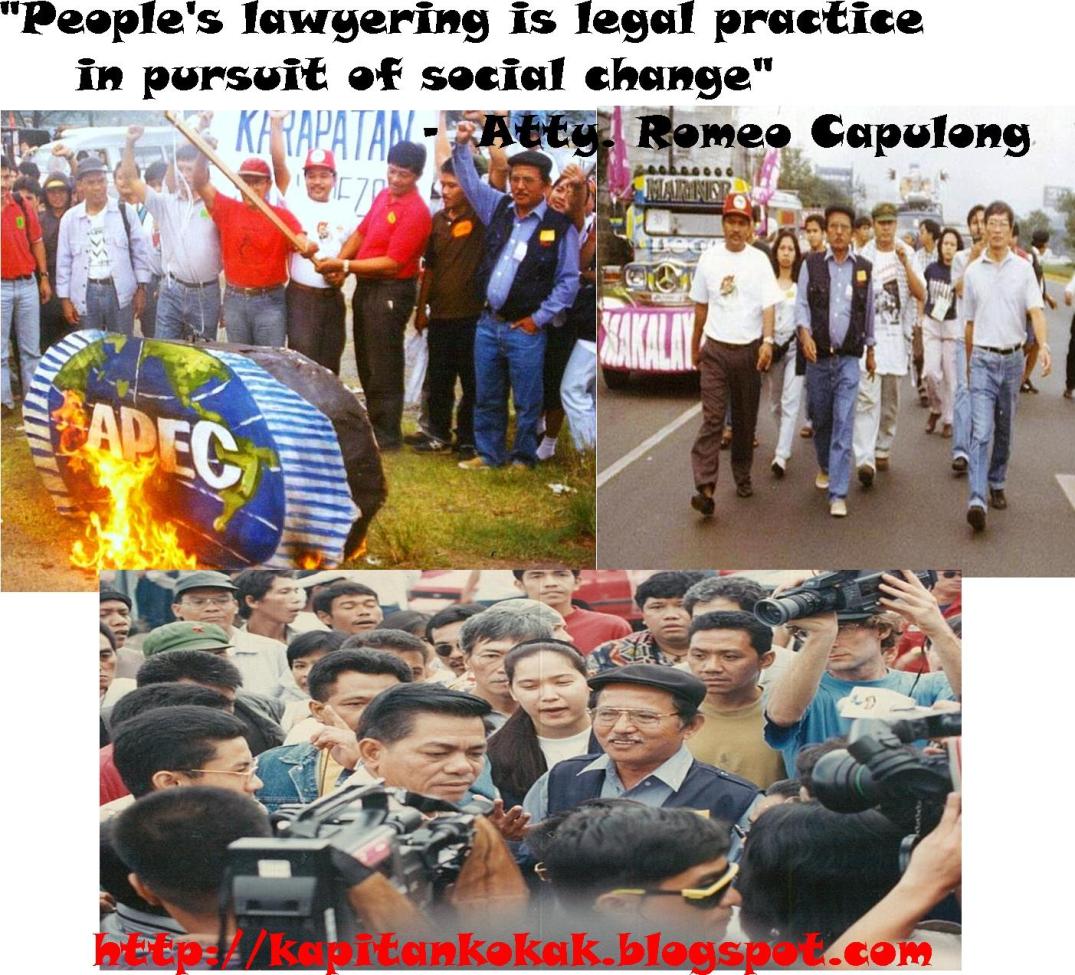
Graphic: A lot of cases due to the struggle. How many lawyers?
Capulong: We have different layers of lawyers… am talking of fulltime lawyers… We have a different set-up for part-time lawyers; sometimes we give them an economic base and they give part of their time sa PILC. Then we have volunteers. And then consultants; when we have a major case, I organize a big team…
Only six are full time. And now Marie Yuvienco has told me she’s leaving and Jason is off to study and we have one on loan to the joint monitoing committee.
Graphic: Funding. Even some Left-linked NGOs accept funding.
Capulong: Probably we are the only law firm engaged on this field that doesn’t accept funding. If you accept funding, here or abroad, they impose conditions and even control your program. So what happens is, NGOs do one thing and do some creative reporting just to meet compliance requirements. I don’t like that.
Besides most of these funds are tainted.
Graphic: How are they tainted?
Capulong: A lot have their own agenda. Many are controlled by the US government.
Graphic: Is that necessarily bad?
Capulong: If you want to defeat armed struggle, you will expand the ranks of reformists. You fund those groups that condemn armed struggle. You pit them against the armed movement. Of course, we (points to Graphic and himself) are reformists. (Laughs)
Graphic: On the other hand, if the reformist movement does manage to win substantial reforms…
Capulong: The technique is very sophisticated and subtle.
Graphic: Have you seen that up close and personal?
Capulong: Okay, one country. You know, all revolutionary movements have interaction or links with other groups. A funder provided money to these groups while peace talks were going on. The funder, which happened to be a government, muscled into the peace process.
Instead of being a neutral observer, it became an arbitrator. The rebels did not want that, the funder threatened to withdraw funds from people’s organizations. And these groups pressured the revolutionary movement.
Graphic: But many groups friendly to the NDF have also been receiving foreign aid, maybe from different sources
Capulong: Yes, there were lots of funders before. That’s what I am saying, we lawyers opted not to. My first board were very young, idealist people…. Alex Padilla, Chet Diokno, Jojo Florendo, Leo Batad; they didn’t want to accept funding.
Maybe, it’s just a matter of strategy. I’m not saying those groups are influenced, malalakas din yan, ideologically.
Also, there’s an advantage if you practice with traditional cases. You don’t get isolated from community… and then may fall back ang lawyers… if something happens to institution or when they get tired of this type of lawyering. Admittedly, dead end yan. You’ll never get rich.
Graphic: So do you see a lot of turnovers?
Capulong: Some but not that fast. Others, I encourage to take new paths. For example, Jong Olalia, Lando’s son, I asked him if he wanted to work for the government. This was soon after Erap (former President Joseph Estada) was ousted; we were part of the presecution team during his impeachment trial. Jong is now labor attaché to Canada.
Look, I don’t want to be self righteous. It’s just that we can afford it. And we value our independence.
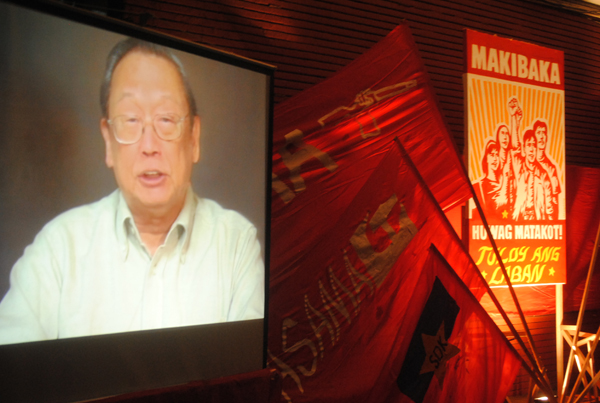
Graphic: Is the NDF a paying client?
Capulong: Definitely not, we end up shelling out funds.
Graphic: Isn’t that called giving aid to the enemy?
Capulong: (Laughs). But during the first peace process between the NDF and the Aquino government, it requested Flag to assign And we asked the government how it viewed our role. The government said it had no problem.
At that time, we didn’t realize we’d be called NDF lawyers or communist lawyers.
Then at one point, when both sides had signed an agreement, I asked Howard Dee (then chief of the GRP negotiating panel) could the government recognize my services, not just to the NDF but to the process itself. So since 2001, my designation has been senior legal consultant to the process… peace process
Of course, the government knows I can’t support their program, dahil what’s there to support?
Graphic: When the peace talks happened in 1986, did you actually believe it would lead somewhere?
Capulong: Oh, yes,
Graphic: It wasn’t just a tactic?
Capulong: Yes, you can even tell me now that I was naive and I’m willing to accept that. May certain degree. But even now, I still believe may certain achievement ang peace process.
Graphic: Movement is rather slow.
Capulong : Right now for example, three substantive topics… human rights and international humanitarian law, may agreement na; social and conomic reforms, both sides have drafts ready since June 2001, four years ago. You’re left with political and constittional reforms. If agreements are forged on all three, it follows there will be cessation of hostilities and disposition of forces…that’s the fourth item…
Graphic: One agreement signed, how long will the rest take?
Capulong: Look at it this way. Since start of peace process in 1986, the framework of both sides were at extremes… The GRP wanted the talks to be held within framework of constitution and for the NDF to lay down their arms before talks can be help. Ang NDF naman wanted explicit recognition of the status of belligerency.
So as early as Sept 1, 1992, during (former President Fidel) Ramos’ term, we were able to resolve fundamental question of framework, by sayind that peace talks would be governed by mutually acceptable principles. No explicit recognition of status of belligerency pero wala din naman capitulation on the part of NDF. That’s important; other peace processes worldwide never resolved the question of framework
And we have agreement on HR and international humanitarian law that’s in place.
Graphic: But its more honoured in the breach, by both sides..
Capulong: Maybe you can put it that way. Marami pang violations…But I believe.., well it’s a form of struggle. Malayo pa,because of the balance of forces. Malakas ang gobyerno and conservatives have the dominant voice.
But I believe in eliminating accusations of bad faith kasi kailangan ang premise mo in good faith. So we’re still pushing. Let’s see where it goes.
Graphic: Some sectors say it’s just an opportunity for the Left to regroup.
Capulong: There are many dividends. During Ramos’ term, there was an image of political stability and investors had more confidence.
Graphic: If peace paid dividends during Ramos’ time and fuelled economic recovery, why haven’t succeeding administrations taken the same tact? Why has the peace process bogged down?
Capulong: Because the last administrations, the government has has not really spoken with one voice. A lot of dynamics inside; you have moderates and hardliners on the panel. Not like NDF, which has a consolidated position
Graphic: Explain these dynamics.
Capulong: In the GRP, aside from the panel and other public officials involved in peace process, there are a lot of outside voices: discordant voices in Congress, the Cabinet and the military. All that, bear upon the actions and decisions of GRP peace panel
Graphic: Any government will have its hardliners. Like the Left.
Capulong: Under GMA, the hardliners are dominant. With Ramos, he was hands on so there was no problem though the hardliners were also there. Howard Dee was a hardliner. At one point, he scuttled the talks. But Ramos vetoed him. When the GRP panel was divided on an issue, it went direct up to Ramos and he decided.
Now, the NDF is expected to push its program as far as it can. But when the NDF wins on one provision, hardliners sound the alarm
Graphic: Who decides under GMA?
Capulong: The other problem in the present government is, there are too many layers in the peace process.
Under FVR, the panel had powers and a certain degree of autonomy, and could act directly under their guidelines. Now, aside from the panel, there’s the Office of the Presidential Adviser on Poverty, the Cabinet cluster on national security, the entire cabinet, then the small circle in Nalacanang
The GRP panel… every step needs a clearance.
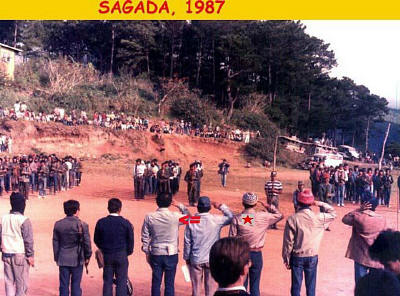
Graphic: We’ve heard all the belligerent statements from all sides. Does this verbal hostility surface during face to face negotiations in Oslo?
Capulong: If the two panels were given autonomy, it won’t be affected by outside pronouncements. That’s why the NDF insisted the talks be held abroad, to minimize pressure.
Graphic: Including posturing
Capulong: Yes, grandstanding sa media. Talks that ignore these move faster.
Graphic: When angry statements are hurled, does it affect the atmosphere during negotiations?
Capulong: No, we all bring the Pinoy culture. Foreign oververs are amazed. People die in the Philippines and we smile at each other, share meals and swap souvenirs in Oslo. That’s Pinoy. You see that with the GRP old timers. Of course, everyone in the NDF is old timer. (Laughs)
Graphic: But the fact that there hasn’t seemed to be any change in NDF panel… is that good or is there need for change? Doesn’t the NDF need some new voices?
Capulong: Peronalities are not really relevant because everyone pushes one progrsam. There’s consistency. But yes, the personalities of the participants can help or burden the process.
Graphic: And Joma helps or burdens?
Capulong: (Laughs) Don’t believe the stereotype. Surprisingly, it’s Joma who’s the good cop. He’s always consistent in that role. If there’s a problem, it gets resolved when Joma comes in. That is how skilled he is.
Graphic: The good cop?
Capulong: (Laughs) Surprised? But that’s true. Ask the GRP panel; that’s also what they say… ask people from the Norway government and they will agree.
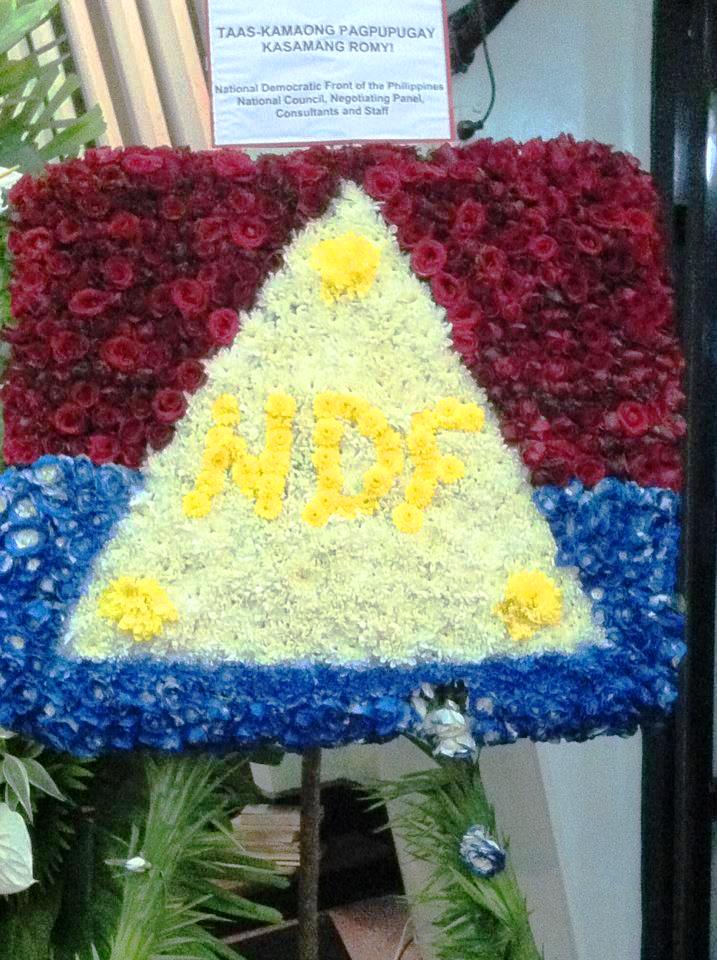
Graphic: However did you get to be involved with the NDF in the first place? No one’s born a people’s lawyer.
Capuong: Even before the NDF asked Flag, I had studied the program.
Graphic: You and the NDF guys are old friends?
Capulang: Yes, I knew Joma way back in 1971. I was a Concon delegate. Many personalities related with us and we didn’t ask if they were underground or legal. We just attended these discussion groups.
But even when I was secretary to Governor Eduardo L. Joson (of Nueva Ecija) from 1960 to 1969, I was already a people’s lawyer. I helped organize legal staff for farmers… I related to old Left, principally Masaka and the new communist party. Even after that split, I continued to help members of masaka. That’s why Masaka backed me.
I was elected on November 70, but would take the seat by June of the following year. I had seven months so I decided to improve my academic skills because practice erodes these.
Graphic: You went on immersion?
Capulong: Yes. (Laughs) At the UP library. And in good company… Carlos Garcia, Diosdado Macapagal, Raul Manlapus, Teofisto Guingona, my own Dean, Cinco, and two editors of the Collegian – Tony Tagamolila and Ed Gonzales.
Graphic: What issues pushed you to gravitate to people’s law?
Capulong: It was gradual until I reached crucial juncture… but the seeds were all there — class background, social background, and sensitivity to injustices. I was the son of a peasant.
I wavered between progressive and traditional. You tend to struggle with your ambitions. For a time I straddled both sides of spectrum… one foot sa traditional lawyering, the other foot in the progressive camp. Until I reached a point I had to choose. That was when my office was raided for second time on October 26, 1979 and I had to go into hiding and then escaped…
Graphic: How did you go to hiding?
Capulang: Mabigat. Simple. Deep hiding. Ang ibig kong sabihin, I wasn’t in the movement pero maraming kilala…(I wasn’t a part of the movement but knew many who were.)
It was Tony Tagamolila who called to warned about impending raids when martial law was declared. Another friend in media also called. By the time soldiers came to our house in UP Village, I was gone.
Graphic: Where did you hide?
Capulong: Just around Metro Manila. Different homes. I was with (former senator Raul)Roco. Other people had their own groups…Heherson Alvarez. Boni Gillego, Tony Pet Araneta…the progressive bloc of the Concon — Voltaire Garcia, Ding Lichauco, Joe Marie Velez…around 37; we were all in hiding but we’d get together from time to time.
Graphic: Was it the underground Left that hid you?
Capulong: (Shakes his head) We had no organization base, only friends. Then Roco thought of an idea. We printed pamphlets; we contacted the Left. We actually looked for them.
Graphic: It must have been a lonely time.
Capulong (Laughs and shakes his head.) We had friends, some in government, some in media. They would ask, ‘what do you need?’ The others would help but scold, ‘sinasabi na nga ba!’ (I told you so). And, of course, there was Sigma Rho.
Graphic: So brotherhood does pay?
Capulong: (Laughs) Sometimes. Enrile was defense chief. Angara worked for Enrile’s law office. Angara and I were friends, we had been dorm mates. Si Liwag, dating boss and colleague sa Concon; he’d reassure us, ‘akong bahala, kausapin si Marcos.’ He had independent efforts to get a memo clearing us.

Graphic: Personal ties in a rainbow coalition?
Capulong: We used connections, yes. Our wives went to everyone, their counterparts … Mrs. Angara, Mrs. Enrile.
Sometimes, they faced humiliation. One time, Enrile snapped at my wife. “I cannot answer that question!” She was asking him for dossiers on what the government had against us.
When the government stabilized, ang temper Enrile okay na, di na masyadong bugnot, (Enrile’s temper cooled down and he wasn’t that grouchy anymore) They reviewed evidence, submit the memo, and the order to throw us in jail was lifted. This was around 1972. We were placed under house arrest.
Graphic: What was it like?
Capulong: Later, it became hard. You had to spend for your guards. They made me report once a week, just to say I wasn’t doing anything bad. I complied with their guidelines.
Graphic: There was nothing to report?
Capulong: Yes, I did not do nothing wrong when I resumed law practice. I’d go to the office with two guards… feed them, whatever, cigarettes. Hard, because I had very few clients, hardly any income.
But the guards and I got closer and one day, they just waved me off and stayed at home while I did my thing.
So I had the opportunity to meet up with Joma. This was 1973.
Graphic: Still in Manila?
Capulong: Bundok na
Graphic: You’re old friends, you had the right influences, experience… why didn’t you go underground?
Capulong: My passion, my love was lawyering. And now lawyerring for our people, poor, oppressed and exploited. That is my passion. That is where I pour all energy and that’s how I want to be known.
With my own son, Eduardo, I had a big debate. My son is a lawyer, professor of law, from Standford, he went to New York University where the climate is more liberal. I would protest that he was a lawyer but did the task of a cadre and an activist. I told him there are many non-lawyers with organizing skills, many who can do cadre work, but there were very few of us lawyers who could serve the masses through law.
Graphic: Always, the movement cast a long shadow.
Capulong: I thought it was complementary to relate with the kilusan. As a people’s lawyer, to be effective, you have to serve organized forces. Kung di sila organized, mas maganda ma-organize sila, politicised and helped to develop strong unity and militance. Mas maganda yun sa laban.
We help those objectives… Who organizes masa? The biggest group is the NDF, and then there are big legal mass organizations. We had to work together because we had a common beneficiary of services.
Graphic: Don’t lines of authority get entangled?
Capulong: If we handle a labor case for a union, there are the union officers, the organizers from outside, and there are the lawyers…Modestly aside, in these cases, I insisted in defining relations and mandate.
Graphic: That’s interesting… a fine balancing act
Capulong: Yes, you will need good relations, all three…you should know your mandate and respect others’….
Our objectives, for example; we have different priorities. What’s principal for one could be secondary for another. But we have to work together well. Fortunately, we have defined relations.
Graphic: Like how?
Capulong: We are an institution. We are not integral to the movement. We are not in-house counsel; we are external lawyers.
That’s a major difference… we deal at arms’ length with our client. Wala kaming dependence sa kilusan for our existence. (We are not dependent on the movement.) Operationally, we have our own policies and internal procedures. But yes, our politics is national democratic politics, which is legal, by the way.
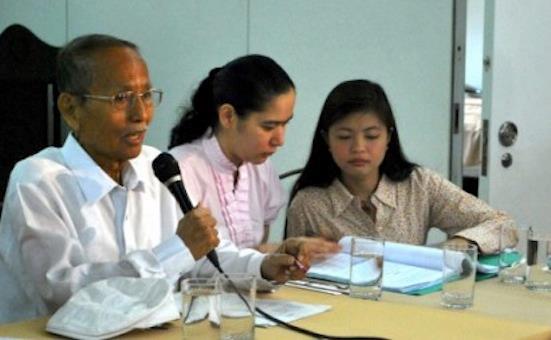 Graphic: Not everyone sees things that clearly
Graphic: Not everyone sees things that clearly
Capulong: Our lawyers are free to embrace, to what extent they get involved with movement. But always, your time – and this is PILC’s basic principle – your time belongs to the center. The center takes care of your economic needs. Your contribution to our struggle is done through PILC in the form of legal service.
Which means bawal maging director or have a position in other organizations… on a case to case basis, some people ask permission; I have yet to grant this.
They’d say, it’s just a small job; they only need my name. As a mater of policy, bawal yun because our time belongs to PILC — our expertise, time and skills as people’s lawyer our contribution to struggle. If that is respected, you have an ideal relationship. And it is being respected.
Graphic: What kind of economic base do you provide?
Capulong: We are trying to be at par with small or medium sized law firms but di namin kaya. Relatively small but within middle class… their needs… certain level of income…our lawyers have cars, even if they have to buy on instalment or get it second hand. They may not yet be able to afford a house, but they are still young. Travel, of course, is a perk and we farm out opportunities to everyone. We don’t get anything from the NDF. First, that’s against policy. Second, as I’ve told the younger lawyers, we can look for other sources of income, but these people toil in the forests and the mountains and far-flung areas, and they don’t have income.
Graphic: Has there been conflict, like, say younger lawyers wanting or not wanting a client, or having ideas different from the client? How do you deal with that?
Capulong: In the handling and acceptance of cases, we have an evaluation committee, both for revenue generating and public interest cases.
It is true, there can be misunderstandings caused by generation gap. I am the oldest. I guess they have learned to accept my weaknesses, but still retain respect for me as their superior, the managing counsel. Not a big problem. They accept my weaknesses; I accept theirs. Working closely together helps forge unity. We’ve tested that at PILC. But yes, sometimes, a young lawyer will leave and it is only later that I hear of his or her sentiments.
Graphic: And what are your weaknesses?
Capulong: Authoritarian ako. Demanding sa tasks.
Kung ano standard sa akin, ganun sa kanila
Graphic: You’re all over the place; doesn’t your family resent that?
Capulong: I had problems before.
Graphic: Just what is demanding?
Capulong: Your time belongs to PILC. We have a daily time record aside from a log book, where you write down what you do, who you are servicing. We have a whereabouts chart. No matter where you are, the office should know. You must be accessible to clients at all times.
Graphic: Do you people have lives?
Capulong: (Laughs) Well, yes, the young lawyers wanted changes. I remain accessible sa client 24 hours; everyone knows that, knows my cellphone number, which hasn’t changed through the years.
The younger lawyers asked for a cut-off time… hanggang 8 p.m. lang. I agreed on one condition. Among ourselves we are accessible to one another, 24 hours.
Graphic: That is tough…
Capulong: There’s more. We have regular evaluation. How much time is input, or revenue earned. This is the principal of self-reliance.
I tell a new lawyer: You will have to generate your own income to maintain your life. Say, P25,000 a month plus appearance fees for paying clients. You raise that salary plus around 10,000 for upkeep — staff salaries, utilities, communications. So you know how much you need to contribute.
It works because our salaries are not delayed; we have not had to seek loans. (Laughs) But of course, every month is suspenseful. I always check. If funds are law, I do double time in our paying client base.
There are new initiatives now… in Central Luzon, the Lawyers for Public Interest, in Iloilo, Naga, Baguio and, surprisingly, Palawan though I have yet to check the situation there.
Graphic: Non-cadre work, cadre time and energy level. You’re no longer managing counsel?
Capulong: No more, just president.
Graphic: Is that preparatory to retirement?
Capulong: Yes. Three years ago, I said, there are things I have to do. Health — if I continue working that hard, I could have five years at most. I’d want some more time.
Graphic: Is the pool dwindling or expanding?
Capulong: We’re not into organizing. Always I say to clients and national leadership, one gauge of your strength is the ability to organize among lawyers. That’s your job, we can only give guidance.
Graphic: Are they listening to you?
Capulong: In 1991, the movement saw the IBP as hopeless, controlled by the establishment, the Sigma Rho. I told them it hasn’t been tapped, it remains the premier association, with stature and resources to help with major cases.
So I broke into the IBP leadership, first by becoming head of the Nueva Ecija chapter, then becoming a governor. (Laughs) I wanted the presidency but my brods blocked that. (Shrugs)
Still, I got a lot of support in proposing development and legal aid. That was approved unanimously during a meeting of the second highest policy-making body. I was actually surprised.
Graphic: So post-PILC work would be IBP?
Capulong: I want to concentrate on how to utilize the IBP to help masses; you don’t need ND politics for that.
Remember the IBP board passed a resolution supporting the termination of the US bases agreements. It was controversial but they did it. Enrile and (former senator Jovito) Salonga were so happy.
Now the IBP has a memorandum of agreement with Migrante and Migrante International. I am working on an MOA between IBP and Karapatan and Selda, and maybe putting up quick reaction team for Bayan during dispersals and arrests.
Graphic: You’ve had two decades, no more, relating with the NDF. You’ve seen the ups and downs, the push and pull of ideological forces. How to you manage to stay out of the fray? And how do you feel as a person and friend of all these people, including the newly dead?
Capulong: I have been privy to info material, access to all sides. But whether consciously or unconsciously, have not sat on any discussion about the debate. I was never invited by either side.
(After a long silence) When the problem erupted, I was in Japan with Nelia (Sancho) and Fidel (Agcaoili). We saw the CPP statement. Our instinct was, this is so sudden. They called and suggested for more time to resolve the issue. But official action had already been done, and Joma had gone public.
At that time, I had more clients with the rejectionist group, or maybe an equal number. Kintanar (Romulo, murdered last year), Bilog (Rafael Salas, now a businessman) who was then involved in the fight, Baylosis (Rafael, now a labor leader), Benjie de Vera, Joy Jopson (Kintanar’s widow). The peace process was not that active then.
I could only listen to all their stories. I kept my friendships but one my one, the RJ clients dropped out. I don’t know… and I feel really bad about this. I wish they’d done it other ways, both sides.
(I had met lawyer Romy Capulong while covering conflict and its fallout. But not until 2004, after this interview, did I get to know him well. Strange, but it was my true-blue capitalist pal, Yvette Lee, who made the introductions. She had met Romy while trying to untangle and solve environmental issues that dogged a former employer. She found him and his band of young lawyers at the Public Interest Law Center tough but reasonable – and funny. That was important to Yvette who bonded with Romy as they embarked in a venture to improve agriculture sustainability. That didn’t fly because of red tape and turf battles in the agriculture department. They went on to explore other possible projects – forestry, among others. Mostly, they just really liked each other. It was fascinating to watch these two spar on the state of the nation amid lots of laughter. Yvette never budged Romy’s beliefs and he never turned her into a leftist. But in all those leisurely lunches and dinners and outings, often with lawyers Marie Yuvienco, Jong Olalia and Rommel Quizon, we learned about the complex moves and the stories, tragic and funny behind the news headlines. In the last two years, we had badgered Romy about writing down his memoirs. He remained busy through his illness. We urged him to get a recorder and just dictate whatever came to mind. Then time run out. I guess we all will have to write his memoirs.)
Thanks for sharing this nice blog. He is one of the greatest lawyer in the Philippines. He uses his skills and intelligence to help bring justice to his fellow countrymen. He is a man of honor.Many people admire him for his doings, and for his willingness to serve the people. He is a great leader. I hope that there are some lawyers that would follow his footsteps, and continue what he started, and to have more people’s lawyer that help poor people.
LikeLike